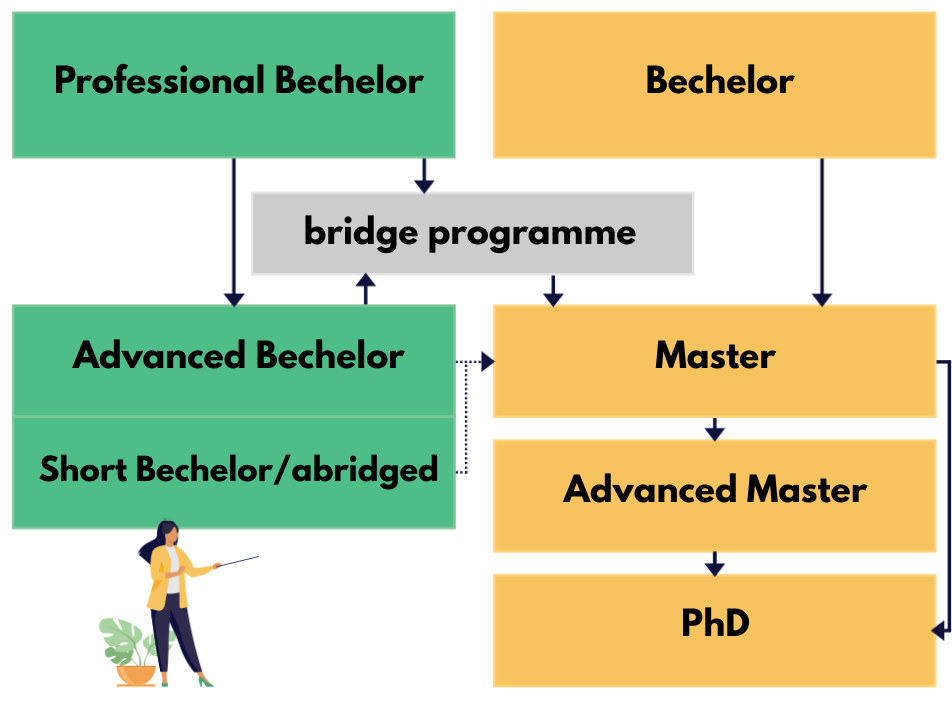High academic quality and affordable tuition are among the main reasons to choose Belgium for your studies. In addition, strong emphasis is placed on practical skills throughout the study period, ensuring excellent preparation for professional life.
International environment
Belgium is home to around 45,000 international students, making it an excellent place to study in a multicultural environment and build connections with people from all over the world. With three official languages—French, Dutch, and German—you will also have the chance to expand your vocabulary with help from the local community.
There are two types of universities in Belgium:
- Universities – these institutions focus more on theoretical and scientific knowledge. Students develop their skills not only through lectures, but also by participating in seminars, conducting research, and working on academic projects.
- Universities of Applied Sciences – the emphasis here is on practical training. A large part of the studies includes hands-on assignments and internships in real companies and organisations.
Study levels in Belgium

Professional Bachelor's programmes
Professional bachelor’s programmes in Belgium usually last 3 years and are offered by universities of applied sciences. These programmes prepare future professionals for careers in specific fields through methods such as project-based work, group assignments, seminars, and practical training. Internships are a standard part of the curriculum in all bachelor’s programmes in Belgium and can take place during the first, second, or third year, depending on the university and the chosen programme.
Bachelor's programmes
Bachelor’s programmes at universities typically last 3 years. These studies place a strong focus on theoretical knowledge, while also including practical components. Students attend lectures, conduct research, participate in seminars, and work on group projects. After completing a bachelor’s degree, graduates are qualified to continue their studies at the master’s level.
Master's programmes
Master’s programmes at Belgian universities typically last 1 to 2 years. Students who have completed an academic bachelor’s degree are eligible to apply. Those who hold a professional bachelor’s degree from a university of applied sciences may also apply, but in most cases, they are required to complete a one-year bridging programme beforehand.
Advanced Bachelor
These programmes last 1 to 2 years, depending on whether they are full-time or part-time. Advanced bachelor’s programmes are designed for those who have already completed a bachelor’s or master’s degree and wish to obtain another bachelor’s degree in a similar or entirely different field. Many universities in Belgium accept students into these programmes even if their previous degree is in an unrelated subject, offering the opportunity to gain a qualification in a new area in just one year.
Short programme/abridged
These programmes last one year. To apply for a short or abridged bachelor’s programme, you must already have a bachelor’s or master’s degree in a related field. Upon completion, you will receive a second bachelor’s degree.
Postgraduate certificate
These programmes last 1 year and are designed to deepen your knowledge and skills in a specific field. You can apply if you have a bachelor’s or master’s degree in a related area. Upon completion, you will be awarded a postgraduate certificate.
Certificate programme
This is a programme focused on gaining specific skills by selecting particular modules you wish to study. It can last up to one year, depending on the number of chosen modules. Upon completion, you will receive a certificate listing the completed and passed modules.
Bridge programa
This one-year programme is intended for students who hold a professional bachelor’s degree and wish to continue their studies at the master’s level. It prepares them for academic studies at a university.
Grading system
In Belgium, the student grading system depends on the region where you study. Most universities use a 0–20 grading scale:
Below 10 – fail
10–12 – satisfactory (passing threshold)
12–13.5 – fairly good
13.5–15.5 – good
15.5–17.5 – very good
17.5–20 – excellent
This grading system may vary slightly between universities, and some Belgian institutions may use a completely different evaluation method.
